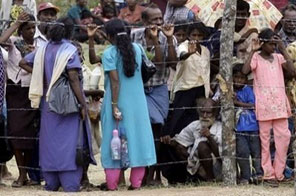Sri Lanka agrees to study EU report
COLOMBO: Sri Lanka on Tuesday agreed to study a European Union report criticising its human rights record, as Brussels threatened to withdraw the island's preferential trading status.
The European Commission submitted Monday the findings of a year-long probe which concluded that the Sri Lankan government was in breach of commitments on human rights and good governance.
Sri Lanka had refused to allow the EU inquiry mission access to the island and insisted that its preferential trade access to the 27-member European bloc should be extended unconditionally.
"The government will closely study the European Commission report," the foreign ministry said in a statement. It stressed Colombo felt it "unnecessary" to allow any investigation.
Sri Lanka has till November 6 to respond to the EU report. Sri Lanka gains about 150 million dollars annually due to the preferential tariff currently granted by the EU, according to trade estimates.
EU trade spokesman Lutz Gullner said in Brussels that "serious problems" were identified in the Brussels probe which accused Sri Lanka of "breaching commitments" made on human rights.
Sri Lanka, which ended a decades-old internal conflict with Tamil Tiger rebels in May, is one of 16 countries benefiting from an EU deal giving its exporters easier access to the EU market.
The deal is offered to developing countries -- provided sustainable development and good governance conditions are met.
These include human rights obligations and working practices, and Brussels says Colombo has still to ratify and apply them fully.
According to the EU report passed to Sri Lanka, "the commission will now decide whether to propose a temporary withdrawal of the special incentive arrangement."
Gullner said member states would now be consulted, and stressed that the commission would be looking for improvement that was "sufficiently serious, rapid and verifiable".






